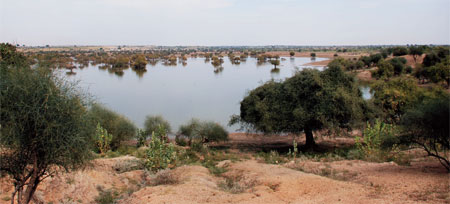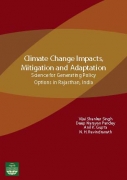Western Plains
Touched by very little water
Posted on 01 Aug, 2013 11:54 AMAuthor and conservationist, Anupam Mishra has spent decades promoting water conservation and management. Through his travels across various states of India, he has been studying and teaching the time-tested techniques of rainwater harvesting.

Government of Rajasthan prepares a working draft of a rural sanitation and hygiene strategy (2012 2022)
Posted on 04 Apr, 2012 09:46 PMAlthough significant progress has been made in terms of individual household toilet coverage in the state, usage by the population is still low at 12.9 per cent (DLHS 2007-08). Access to toilets for schools and angawandies has seen a marked increased but rural solid and liquid waste management has seen little or no attention.
Best meal of the day': Akshaya Patra's kitchen in Nathwara, Rajasthan is the newest of its high-technology ones across India
Posted on 19 Mar, 2012 10:23 AMArticle and Image Courtesy : One World South Asia
Author : Madhusmita Hazarika
Rural water access: Governance and contestation in a semi-arid watershed in Udaipur, Rajasthan: A paper in EPW
Posted on 21 Feb, 2012 05:19 PMStudy area
This study is carried out in micro-watershed No.19, which comprises six villages in Jhadol tehsil of Udaipur district in Rajasthan. A minor irrigation project completed in 1980 serves these six villages
Rainfall, storage levels in reservoir and groundwater use
Changing currents: Plumbing the rights: A film highlighting water as a common good
Posted on 10 Jan, 2012 08:55 PMSource: Culture Unplugged
A late twentieth century folk tale - How rainwater harvesting creates a river in Alwar, Rajasthan
Posted on 28 Jul, 2011 03:30 PMVideo courtesy: Soumitradey
Water turns the tide - A barren district of Rajasthan is seeing development, thanks to rains last year and floods in 2006
Posted on 12 Apr, 2011 11:31 AMArticle and Image Courtesy: Down To Earth
Author:
A barren district of Rajasthan is seeing development, thanks to rains last year and flood in 2006.
 Administration has revived a man-made pond in Nagarda village that was drying up.
Administration has revived a man-made pond in Nagarda village that was drying up.
Photo: Sayantoni Palchoudhuri
Using media to address water issue in Rajasthan - Video Volunteers
Posted on 28 Jan, 2011 12:00 PMDuring her yearlong stay, Tara trained at least twenty people into video production some of whom have succeeded in finding work in the local market as photographers, cameramen and wedding video makers. In this blog she gives a vivid account of the CVU, its producers and their work.
Climate change impacts, mitigation and adaptation - Science for generating policy options in Rajasthan
Posted on 20 Dec, 2010 09:14 PM This paper by Rajasthan Pollution Control Board on climate change impacts in the context of Rajasthan seeks to address the issue of need of the society for robust knowledge to pursue strategies for mitigation as well as adaptation in order to address the challenges associated with global warming and climate change.
This paper by Rajasthan Pollution Control Board on climate change impacts in the context of Rajasthan seeks to address the issue of need of the society for robust knowledge to pursue strategies for mitigation as well as adaptation in order to address the challenges associated with global warming and climate change.
Accordingly, here a brief review of the available literature and an annotated bibliography of published research on climate change impacts, mitigation and adaptation in order to facilitate the identification of policy options in Rajasthan is provided.
Also included is the literature on how human societies contribute to environmental change and how, in turn, become vulnerable to these changes. It also explores the available knowledge on how likely ecosystem goods and services are impacted to climatic oscillations (environmental sensitivity) and the ability of rural communities to cope (social resilience) with those changes.
